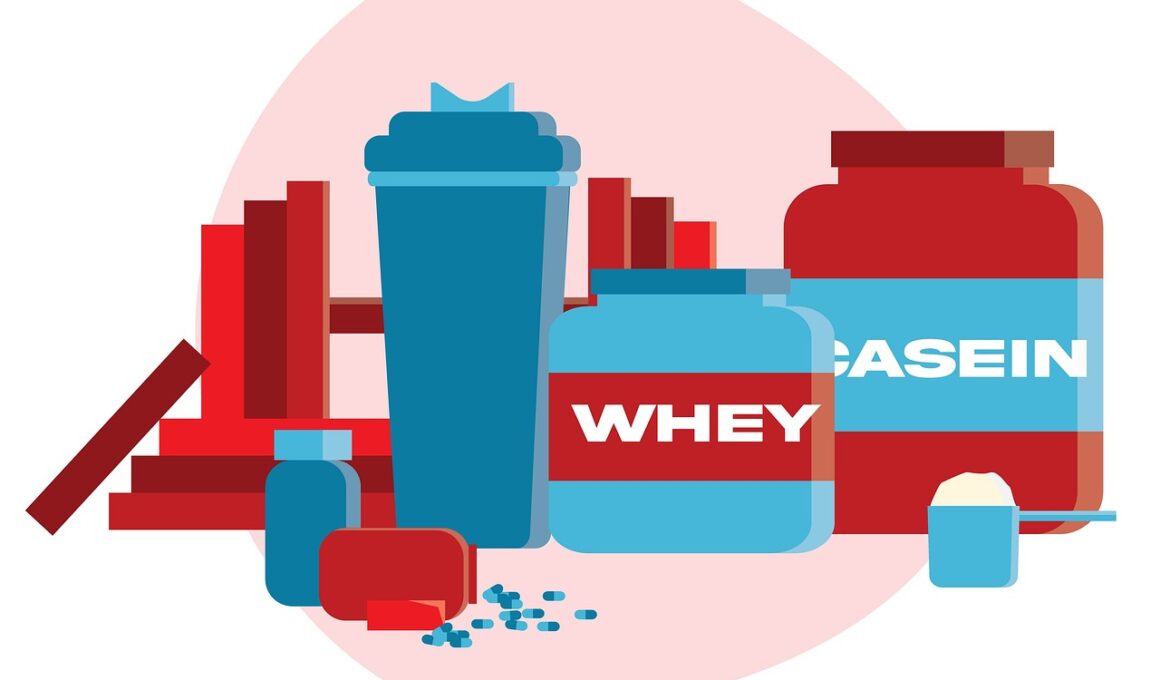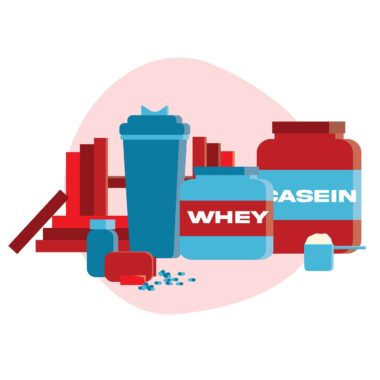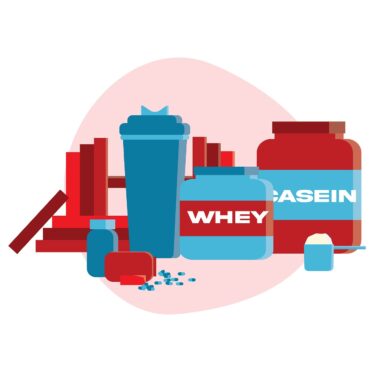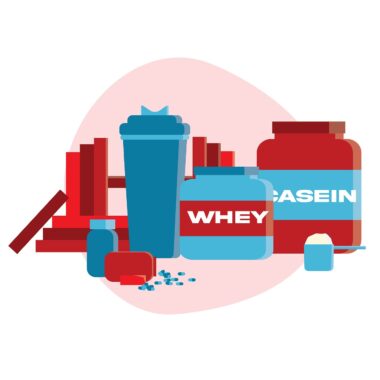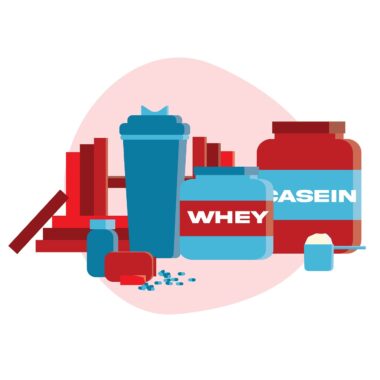Combining Protein Powders with Other Supplements Safely
When it comes to sports nutrition, combining protein powders with other supplements can help enhance performance and recovery. However, it’s crucial to approach this combination with care. A balanced diet provides many nutrients, but supplements can fill gaps especially for athletes. Generally, protein powders come from various sources like whey, casein, and plant-based options. Each type has specific benefits and absorption rates. When stacking protein with other supplements such as branched-chain amino acids (BCAAs) or creatine, choose those that align with your fitness goals. For example, if muscle gain is a priority, BCAAs can help prevent muscle breakdown. Additionally, creatine can improve your strength and recovery processes. However, ensure that your total daily protein intake remains within recommended limits, typically around 1.6 to 2.2 grams per kilogram of body weight. Be mindful of protein quality, as whole foods often provide additional micronutrients beneficial for recovery. Always consult with a healthcare professional or registered dietitian before starting any supplementation regimen to ensure safety and effectiveness.
Safety and Considerations
Safety must be a priority when combining protein powders with any other supplements. First, evaluate the ingredients in your protein shake and the additional supplements you intend to use. Check for potential interactions that may cause adverse reactions. For those new to supplementation, sticking to single ingredients allows for better understanding of how each one affects your body. Pay attention to serving sizes, as exceeding recommended dosages can lead to complications. For example, taking too much protein can strain kidneys, particularly if you have pre-existing conditions. Gradual introduction of new supplements helps monitor for unwanted side effects, such as digestive issues. Staying hydrated is also critical, as both protein powders and creatine require adequate fluid intake to maximize efficacy and avoid cramping. If you experience unusual symptoms like nausea or excessive fatigue, stop using the supplements and consult a healthcare professional. Lastly, consider your overall diet and lifestyle; supplements should complement, not replace, a healthy eating pattern that includes a variety of foods.
Protein powders, especially in combination with other supplements, can trigger specific health benefits. For muscle recovery and growth, many athletes turn to a blend of protein powder and BCAAs. These amino acids are crucial for muscle repair after intense workouts and can expedite recovery. The timing of consumption plays a pivotal role, ideally taken within the window of 30 minutes post-exercise for maximum effectiveness. Furthermore, adding a carbohydrate source, such as a banana or oatmeal, along with your protein shake can enhance glycogen replenishment. The incorporation of a multivitamin addresses potential micronutrient deficiencies that may arise from rigorous training and can support overall well-being in athletes. Take care to use reputable supplement brands that provide third-party testing to verify ingredient purity. In addition, avoid blends that include excessive fillers, unhealthy sugars, or artificial additives. By maintaining a consistent routine of protein and supplement intake, you’ll achieve optimal physical performance. Each component of your regimen should be tailored to your unique needs, whether you are bulking, cutting or aiming for general well-being. Always track progress and adjust accordingly.
Combining Nutrients Effectively
Combining protein powders with other types of supplements can enhance nutrient absorption and effectiveness. For instance, taking vitamin D3 or omega-3 fatty acids along with protein can be beneficial. Vitamin D3 influences muscle function and strength while omega-3s are known for their anti-inflammatory properties. The presence of healthy fats in omega-3s can also aid in the absorption of fat-soluble vitamins crucial for athletes. Furthermore, caffeine can be another addition to your supplement mix; it is known for improving energy levels and performance during workouts. However, it’s pivotal to caution against high caffeine levels, as they can lead to jitters and increased heart rate. Always consider the timing of your caffeine intake; too close to bedtime can affect sleep quality. When experimenting with combinations, maintain a food diary to track results and reactions of your body. Each individual’s response to combinations can vary significantly, so it’s vital to find what works best for you. As always, consult a nutrition expert for personalized recommendations tailored to your training goals and lifestyle.
The market for protein powders and dietary supplements is vast and often overwhelming. Research plays an essential role in choosing reputable products that fit your personal fitness objectives and dietary restrictions. Labels should provide clear ingredient lists, recommended serving sizes, and details about sourcing practices. Look for brands known for transparency and quality assurance; third-party certifications can be an excellent indicator of credibility. Additionally, compare protein content across different powders, especially if you adhere to specific dietary requirements. Vegan, gluten-free, and non-GMO options are widely available. Furthermore, price can often reflect quality; cheap options may compromise on ingredient sourcing or purity. Online reviews and recommendations can provide insight into others’ experiences, contributing to informed choices. Avoid falling for marketing gimmicks that promise quick results; effective supplementation takes time. Ultimately, a well-informed decision will lead to successful outcomes. Engaging with a community focused on health and fitness can further enhance your knowledge and sustainability. Remember, supplements are designed to enhance, not replace, a balanced diet and training program tailored to your individual needs.
Monitoring Your Progress
Monitoring progress while using protein powders and additional supplements is crucial for determining effectiveness. Keeping track of performance metrics, such as strength gains, recovery times, and muscle growth, will help you assess if your regimen is meeting your fitness goals. A daily log can serve as an excellent tool, detailing workouts, dietary habits, and supplementation schedules. However, take note that individual results can vary based on factors such as age, fitness level, and overall diet. Taking photographs or measurements can also be helpful visual indicators of progress over time. Weekly or monthly evaluations aid in adjustments to your regimen, enabling you to optimize timing, dosages, and combinations that work best for you. It’s also beneficial to stay consistent with your supplementation schedule; irregular timing can inhibit potential benefits. Utilize mobile apps or productivity tools to assist in tracking your intake efficiently. Regular communication with a trainer or dietitian can provide additional accountability and advice. Ultimately, this ongoing assessment allows for strategic changes in your approach, ensuring that you remain aligned with personal wellness and fitness objectives.
In summary, combining protein powders with other supplements can facilitate enhanced athletic performance and recovery when done thoughtfully. Prioritize safety by incorporating one supplement at a time and watching for interactions. Establish clear goals for your supplementation routine, whether that be muscle gain, recovery, or overall health improvement. Pay special attention to the quality of the products chosen and make sure they complement a well-rounded diet full of nutrient-rich whole foods. Remember the significance of hydration as you increase your supplement intake, supporting optimal metabolic processes. Gradually adjusting your regimen and monitoring your body’s responses will help customize your approach more effectively. It’s wise to consult with healthcare professionals or dietitians to ensure sustainable practices, particularly if you have underlying health concerns. With discipline, knowledge, and a balanced approach to supplementation, you can maximize your physical performance while safeguarding your health. Strive to cultivate a lifestyle that celebrates nutrition, strength, and overall wellness as you navigate your path towards a healthier and more fit you.
Conclusion
Your journey through sports nutrition should include an open dialogue about your needs, preferences, and experiences with protein powders and supplements. Engaging with a diverse range of perspectives can expand understanding and enjoyment of your supplement mix. Remember, consistency in nutrition and supplementation, combined with a solid fitness routine, will lead to sustainable results. Be patient; results take time, and enjoying the process can make a significant difference in motivation and success.
